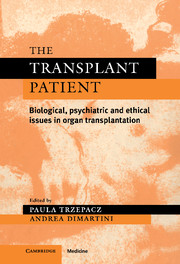Book contents
- Frontmatter
- Contents
- List of contributors
- Preface
- 1 The mystique of transplantation: biologic and psychiatric considerations
- 2 Psychosocial screening and selection of candidates for organ transplantation
- 3 Psychosocial issues in living organ donation
- 4 Quality of life in organ transplantation: effects on adult recipients and their families
- 5 Quality of life of geriatric patients following transplantation: short- and long-term outcomes
- 6 Cognitive assessment in organ transplantation
- 7 Pharmacologic issues in organ transplantation: psychopharmacology and neuropsychiatric medication side effects
- 8 Alcoholism and organ transplantation
- 9 Ethics and images in organ transplantation
- 10 Psychoneuroimmunology and organ transplantation: theory and practice
- 11 Pediatric transplantation
- 12 Current trends and new developments in transplantation
- Index
4 - Quality of life in organ transplantation: effects on adult recipients and their families
Published online by Cambridge University Press: 14 September 2009
- Frontmatter
- Contents
- List of contributors
- Preface
- 1 The mystique of transplantation: biologic and psychiatric considerations
- 2 Psychosocial screening and selection of candidates for organ transplantation
- 3 Psychosocial issues in living organ donation
- 4 Quality of life in organ transplantation: effects on adult recipients and their families
- 5 Quality of life of geriatric patients following transplantation: short- and long-term outcomes
- 6 Cognitive assessment in organ transplantation
- 7 Pharmacologic issues in organ transplantation: psychopharmacology and neuropsychiatric medication side effects
- 8 Alcoholism and organ transplantation
- 9 Ethics and images in organ transplantation
- 10 Psychoneuroimmunology and organ transplantation: theory and practice
- 11 Pediatric transplantation
- 12 Current trends and new developments in transplantation
- Index
Summary
Introduction
Over the past 25 to 30 years, the call to examine quality of life (QOL) as it is affected by transplantation has become stronger and more urgent. This has occurred because transplantation technology and immunosuppression have improved, leading transplants of many types to become more prevalent. The increasing prevalence of transplantation demands that we consider the full range of costs and benefits of these therapies to the individual recipient, his or her family, and society at large.
It is customary to begin articles focused on QOL in transplantation with the statement that QOL has seldom been investigated and/or that little is known about QOL in transplantation. In this review, we suggest that the first point is no longer true for the established types of transplantation in adults and, as regards the second, that more is known about QOL in transplantation than has been previously recognized. There are certainly gaps in what is known, and studies vary widely in their ability to contribute to this knowledge base depending on their design, the number of subjects and the types of comparison groups included. Nevertheless, as we have argued previously (Dew and Simmons 1990; Dew 1998), just as psychometric principles show that multi-item measures of any given domain increase the reliability of our overall assessment of the domain, so too do multiple studies of QOL – each with its own strengths and weaknesses – yield a more complete and accurate understanding of QOL in transplantation than that contained in any single investigation.
- Type
- Chapter
- Information
- The Transplant PatientBiological, Psychiatric and Ethical Issues in Organ Transplantation, pp. 67 - 145Publisher: Cambridge University PressPrint publication year: 2000
- 15
- Cited by

